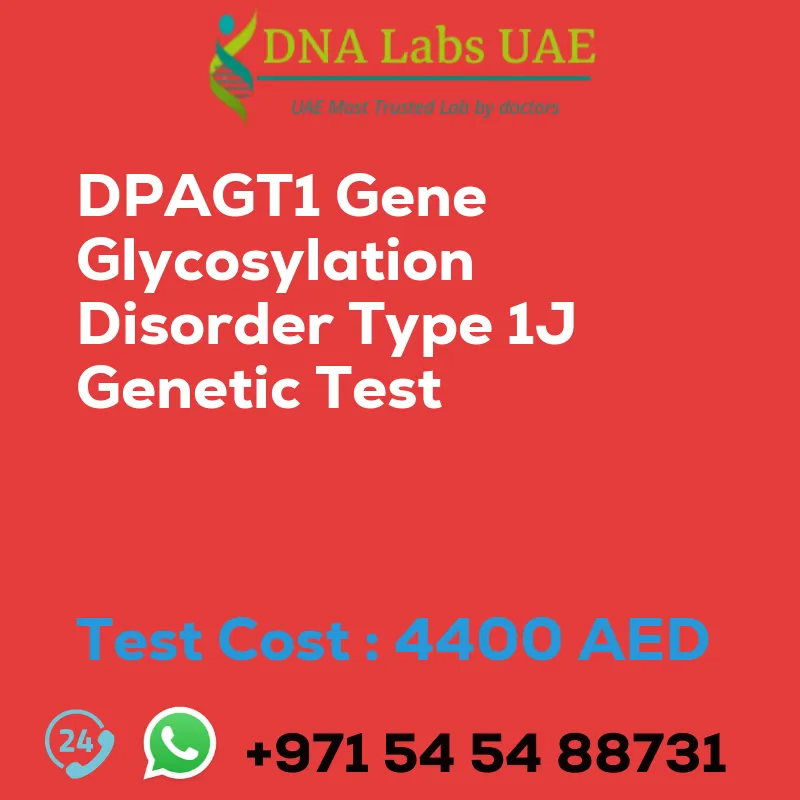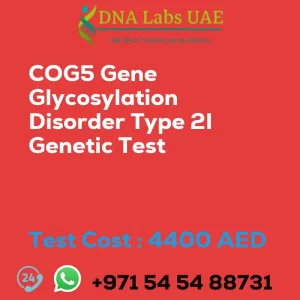DPAGT1 Gene Glycosylation Disorder Type 1J Genetic Test
Test Name: DPAGT1 Gene Glycosylation Disorder Type 1J Genetic Test
Components: Blood or Extracted DNA or One drop Blood on FTA Card
Price: 4400.0 AED
Sample Condition: Blood or Extracted DNA or One drop Blood on FTA Card
Report Delivery: 3 to 4 Weeks
Method: NGS Technology
Test Type: Metabolic Disorders
Doctor: General Physician
Test Department: Genetics
Pre Test Information: Clinical History of Patient who is going for DPAGT1 Gene Glycosylation Disorder Type 1J NGS Genetic DNA Test. A Genetic Counselling session to draw a pedigree chart of family members affected with Glycosylation Disorder Type 1J
Test Details
DPAGT1 gene glycosylation disorder type 1J is a rare genetic disorder that affects the glycosylation process in the body. This disorder is caused by mutations in the DPAGT1 gene, which is responsible for encoding an enzyme called dolichyl-phosphate N-acetylglucosaminephosphotransferase 1.
Glycosylation is a process in which sugar molecules are attached to proteins or lipids to form glycoproteins or glycolipids. This process is important for the proper functioning of many proteins and lipids in the body. Mutations in the DPAGT1 gene disrupt the glycosylation process, leading to a wide range of symptoms and complications.
NGS (Next-Generation Sequencing) genetic testing is a type of genetic test that uses advanced sequencing technologies to analyze multiple genes simultaneously. In the case of DPAGT1 gene glycosylation disorder type 1J, NGS genetic testing can be used to identify mutations in the DPAGT1 gene and confirm a diagnosis.
NGS genetic testing involves obtaining a DNA sample, usually through a blood sample or a saliva sample. The DNA is then sequenced using NGS technologies, which can analyze multiple genes at once. The sequencing data is then compared to a reference genome to identify any genetic variations or mutations in the DPAGT1 gene.
The results of the NGS genetic test can help healthcare professionals diagnose DPAGT1 gene glycosylation disorder type 1J and provide appropriate management and treatment options. It can also help in genetic counseling and family planning for individuals with a known mutation in the DPAGT1 gene.
It is important to note that NGS genetic testing may not be available in all healthcare settings and may require specialized laboratories or genetic testing facilities. Additionally, the cost and availability of NGS genetic testing may vary depending on the location and healthcare system.
| Test Name | DPAGT1 Gene Glycosylation disorder type 1J Genetic Test |
|---|---|
| Components | |
| Price | 4400.0 AED |
| Sample Condition | Blood or Extracted DNA or One drop Blood on FTA Card |
| Report Delivery | 3 to 4 Weeks |
| Method | NGS Technology |
| Test type | Metabolic Disorders |
| Doctor | General Physician |
| Test Department: | Genetics |
| Pre Test Information | Clinical History of Patient who is going for DPAGT1 Gene Glycosylation disorder type 1J NGS Genetic DNA Test A Genetic Counselling session to draw a pedigree chart of family members affected with Glycosylation disorder type 1J |
| Test Details |
DPAGT1 gene glycosylation disorder type 1J is a rare genetic disorder that affects the glycosylation process in the body. This disorder is caused by mutations in the DPAGT1 gene, which is responsible for encoding an enzyme called dolichyl-phosphate N-acetylglucosaminephosphotransferase 1. Glycosylation is a process in which sugar molecules are attached to proteins or lipids to form glycoproteins or glycolipids. This process is important for the proper functioning of many proteins and lipids in the body. Mutations in the DPAGT1 gene disrupt the glycosylation process, leading to a wide range of symptoms and complications. NGS (Next-Generation Sequencing) genetic testing is a type of genetic test that uses advanced sequencing technologies to analyze multiple genes simultaneously. In the case of DPAGT1 gene glycosylation disorder type 1J, NGS genetic testing can be used to identify mutations in the DPAGT1 gene and confirm a diagnosis. NGS genetic testing involves obtaining a DNA sample, usually through a blood sample or a saliva sample. The DNA is then sequenced using NGS technologies, which can analyze multiple genes at once. The sequencing data is then compared to a reference genome to identify any genetic variations or mutations in the DPAGT1 gene. The results of the NGS genetic test can help healthcare professionals diagnose DPAGT1 gene glycosylation disorder type 1J and provide appropriate management and treatment options. It can also help in genetic counseling and family planning for individuals with a known mutation in the DPAGT1 gene. It is important to note that NGS genetic testing may not be available in all healthcare settings and may require specialized laboratories or genetic testing facilities. Additionally, the cost and availability of NGS genetic testing may vary depending on the location and healthcare system. |








